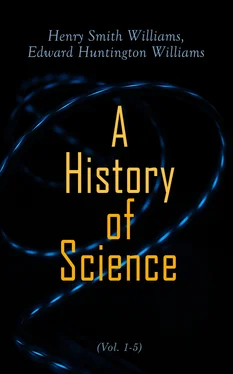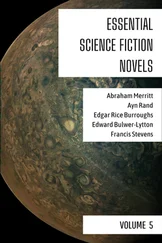Henry Smith Williams, Edward Huntington Williams
A History of Science
(Vol. 1-5)
Complete Edition
e-artnow, 2021
Contact: info@e-artnow.org
EAN 4064066387884
Volume 1 Volume 1 Table of Contents
Volume 2 Volume 2 Table of Contents
Volume 3
Volume 4
Volume 5
Table of Contents Table of Contents Volume 1 Volume 1 Table of Contents Volume 2 Volume 2 Table of Contents Volume 3 Volume 4 Volume 5
BOOK I BOOK I Table of Contents Should the story that is about to be unfolded be found to lack interest, the writers must stand convicted of unpardonable lack of art. Nothing but dulness in the telling could mar the story, for in itself it is the record of the growth of those ideas that have made our race and its civilization what they are; of ideas instinct with human interest, vital with meaning for our race; fundamental in their influence on human development; part and parcel of the mechanism of human thought on the one hand, and of practical civilization on the other. Such a phrase as "fundamental principles" may seem at first thought a hard saying, but the idea it implies is less repellent than the phrase itself, for the fundamental principles in question are so closely linked with the present interests of every one of us that they lie within the grasp of every average man and woman—nay, of every well-developed boy and girl. These principles are not merely the stepping-stones to culture, the prerequisites of knowledge—they are, in themselves, an essential part of the knowledge of every cultivated person. It is our task, not merely to show what these principles are, but to point out how they have been discovered by our predecessors. We shall trace the growth of these ideas from their first vague beginnings. We shall see how vagueness of thought gave way to precision; how a general truth, once grasped and formulated, was found to be a stepping-stone to other truths. We shall see that there are no isolated facts, no isolated principles, in nature; that each part of our story is linked by indissoluble bands with that which goes before, and with that which comes after. For the most part the discovery of this principle or that in a given sequence is no accident. Galileo and Keppler must precede Newton. Cuvier and Lyall must come before Darwin;—Which, after all, is no more than saying that in our Temple of Science, as in any other piece of architecture, the foundation must precede the superstructure. We shall best understand our story of the growth of science if we think of each new principle as a stepping-stone which must fit into its own particular niche; and if we reflect that the entire structure of modern civilization would be different from what it is, and less perfect than it is, had not that particular stepping-stone been found and shaped and placed in position. Taken as a whole, our stepping-stones lead us up and up towards the alluring heights of an acropolis of knowledge, on which stands the Temple of Modern Science. The story of the building of this wonderful structure is in itself fascinating and beautiful.
I. PREHISTORIC SCIENCE
II. EGYPTIAN SCIENCE
III. SCIENCE OF BABYLONIA AND ASSYRIA
IV. THE DEVELOPMENT OF THE ALPHABET
V. THE BEGINNINGS OF GREEK SCIENCE
VI. THE EARLY GREEK PHILOSOPHERS IN ITALY
VII. GREEK SCIENCE IN THE EARLY ATTIC PERIOD
VIII. POST-SOCRATIC SCIENCE AT ATHENS—PLATO, ARISTOTLE, AND THEOPHRASTUS
IX. GREEK SCIENCE OF THE ALEXANDRIAN OR HELLENISTIC PERIOD
X. SCIENCE OF THE ROMAN PERIOD
XI. A RETROSPECTIVE GLANCE AT CLASSICAL SCIENCE
APPENDIX REFERENCE LIST, NOTES, AND BIBLIOGRAPHIES
CHAPTER I. PREHISTORIC SCIENCE
CHAPTER II. EGYPTIAN SCIENCE
CHAPTER III. SCIENCE OF BABYLONIA AND ASSYRIA
CHAPTER IV. THE DEVELOPMENT OF THE ALPHABET
CHAPTER V. THE BEGINNINGS OF GREEK SCIENCE
CHAPTER VI. THE EARLY GREEK PHILOSOPHERS IN ITALY
CHAPTER VII. GREEK SCIENCE IN THE EARLY ATTIC PERIOD
CHAPTER VIII. POST-SOCRATIC SCIENCE AT ATHENS
CHAPTER IX. GREEK SCIENCE OF THE ALEXANDRIAN OR HELLENISTIC PERIOD
CHAPTER X. SCIENCE OF THE ROMAN PERIOD
CHAPTER XI. A RETROSPECTIVE GLANCE AT CLASSICAL SCIENCE
Table of Contents
Should the story that is about to be unfolded be found to lack interest, the writers must stand convicted of unpardonable lack of art. Nothing but dulness in the telling could mar the story, for in itself it is the record of the growth of those ideas that have made our race and its civilization what they are; of ideas instinct with human interest, vital with meaning for our race; fundamental in their influence on human development; part and parcel of the mechanism of human thought on the one hand, and of practical civilization on the other. Such a phrase as "fundamental principles" may seem at first thought a hard saying, but the idea it implies is less repellent than the phrase itself, for the fundamental principles in question are so closely linked with the present interests of every one of us that they lie within the grasp of every average man and woman—nay, of every well-developed boy and girl. These principles are not merely the stepping-stones to culture, the prerequisites of knowledge—they are, in themselves, an essential part of the knowledge of every cultivated person.
It is our task, not merely to show what these principles are, but to point out how they have been discovered by our predecessors. We shall trace the growth of these ideas from their first vague beginnings. We shall see how vagueness of thought gave way to precision; how a general truth, once grasped and formulated, was found to be a stepping-stone to other truths. We shall see that there are no isolated facts, no isolated principles, in nature; that each part of our story is linked by indissoluble bands with that which goes before, and with that which comes after. For the most part the discovery of this principle or that in a given sequence is no accident. Galileo and Keppler must precede Newton. Cuvier and Lyall must come before Darwin;—Which, after all, is no more than saying that in our Temple of Science, as in any other piece of architecture, the foundation must precede the superstructure.
We shall best understand our story of the growth of science if we think of each new principle as a stepping-stone which must fit into its own particular niche; and if we reflect that the entire structure of modern civilization would be different from what it is, and less perfect than it is, had not that particular stepping-stone been found and shaped and placed in position. Taken as a whole, our stepping-stones lead us up and up towards the alluring heights of an acropolis of knowledge, on which stands the Temple of Modern Science. The story of the building of this wonderful structure is in itself fascinating and beautiful.
Table of Contents
To speak of a prehistoric science may seem like a contradiction of terms. The word prehistoric seems to imply barbarism, while science, clearly enough, seems the outgrowth of civilization; but rightly considered, there is no contradiction. For, on the one hand, man had ceased to be a barbarian long before the beginning of what we call the historical period; and, on the other hand, science, of a kind, is no less a precursor and a cause of civilization than it is a consequent. To get this clearly in mind, we must ask ourselves: What, then, is science? The word runs glibly enough upon the tongue of our every-day speech, but it is not often, perhaps, that they who use it habitually ask themselves just what it means. Yet the answer is not difficult. A little attention will show that science, as the word is commonly used, implies these things: first, the gathering of knowledge through observation; second, the classification of such knowledge, and through this classification, the elaboration of general ideas or principles. In the familiar definition of Herbert Spencer, science is organized knowledge.
Читать дальше












